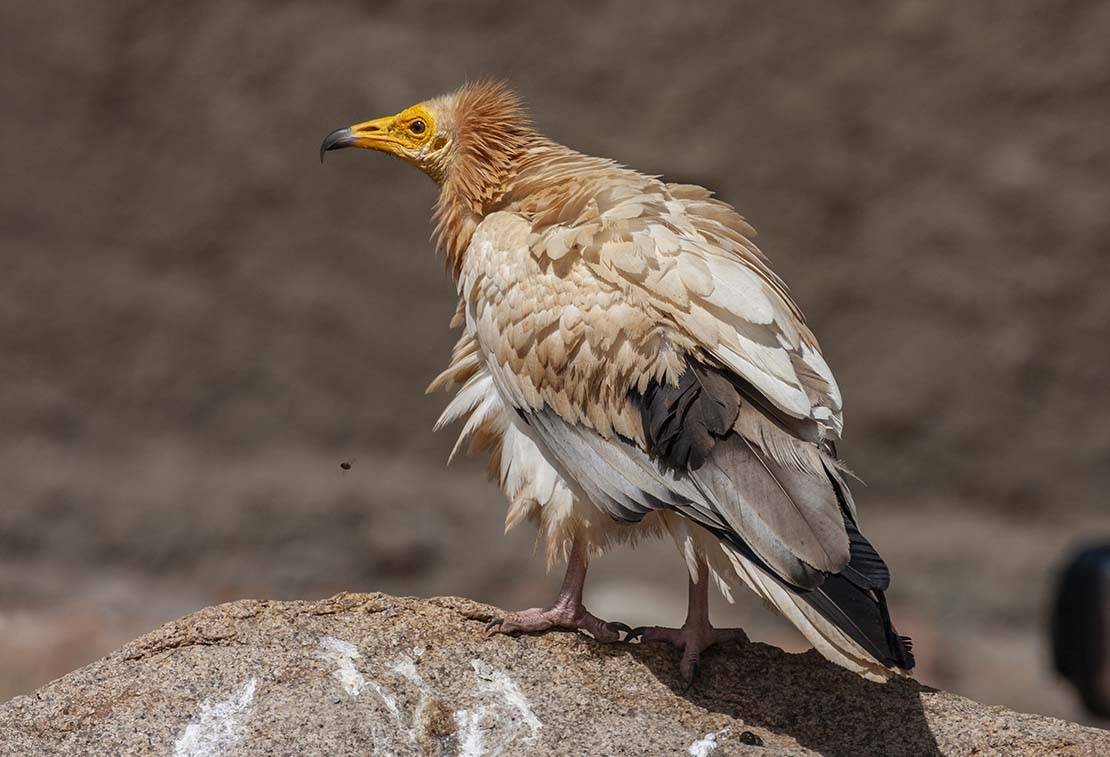
The year 2020 will undoubtedly be remembered for the global pandemic which has affected so many people around the world. As with many small charities, the unprecedented situation has thrown up many challenges that have impacted the work of OSME, both negatively and positively. However, due to the continued diligent management of our finances and the ongoing support of OSME members, we have been able to continue expanding our work across the region.
It was an exceptional year for our Conservation Fund with 11 projects supported with a combined total of £22,723 – our highest ever level of expenditure and in line with Council’s target of £20k by 2020. The funded projects are listed here, and more detail will be published in the autumn issue of Sandgrouse:
- Educational programme for ‘Phasianus’ student club – building capacity for IBA monitoring, Uzbekistan: £1,900
- Determining the breeding status of Scopoli’s (Calonectris diomedea) and Yelkouan Shearwaters (Puffinus yelkouan) in Cyprus: £4,528
- The use of bio-acoustic monitors to measure shooting rates at migratory bottlenecks, Lebanon: £2,000
- Spring is in the air: growing Georgian leadership in monitoring and conservation at Batumi Raptor Count, Georgia: £2,000
- Quantifying the risk of exposure to harmful agricultural veterinary pharmaceuticals via coprophagy for globally endangered Egyptian Vultures (Neophron percnopterus), United Arab Emirates: £1,900
- Determination of Great Bustard Friendly Crop Production Practices in wider Acıgöl Basin, Turkey: £2,000
- Continued monitoring of Sociable Lapwing migration through Kumo-Manych depression, Russian Federation: £1,100
- Gap filling survey in the mid reaches of the Araks River valley, Armenia: £2,000
- Tackling illegal hunting in northern Cyprus: £2,000
- Supporting International Vulture Awareness Day activities on Socotra, Yemen: £400
- Monitoring the globally Vulnerable Sooty Falcon Falco concolor breeding population, Israel: £2,895
Providing our largest ever Conservation Fund grant to BirdLife Cyprus for their survey of Yelkouan and Scopoli Shearwaters fills an important gap in the countries where we have funded projects. Within the OSME region only Kuwait, Qatar and Turkmenistan are yet to receive funding from the Conservation Fund – we welcome applications from these countries so we can achieve a target of all OSME countries receiving at least one grant by the end of 2023. The continued growth in Conservation Fund expenditure would not have been possible without the direct support of the March Conservation Fund of the Tides Foundation, and the ever increasing generosity of members and supporters who make individual donations. All donations really make a difference to the work that we can fund. A crucial part of the Conservation Fund is how we decide which projects to support. We receive many more applications than we are able to fund and the task of advising OSME Council on project funding is overseen by an independent review committee chaired by Dr Maxim Koshkin with expert input from Nabegh Ghazal Asswad, Sharif Jbour, Richard Porter, Hana Raza and Maïa Sarrouf Willson.
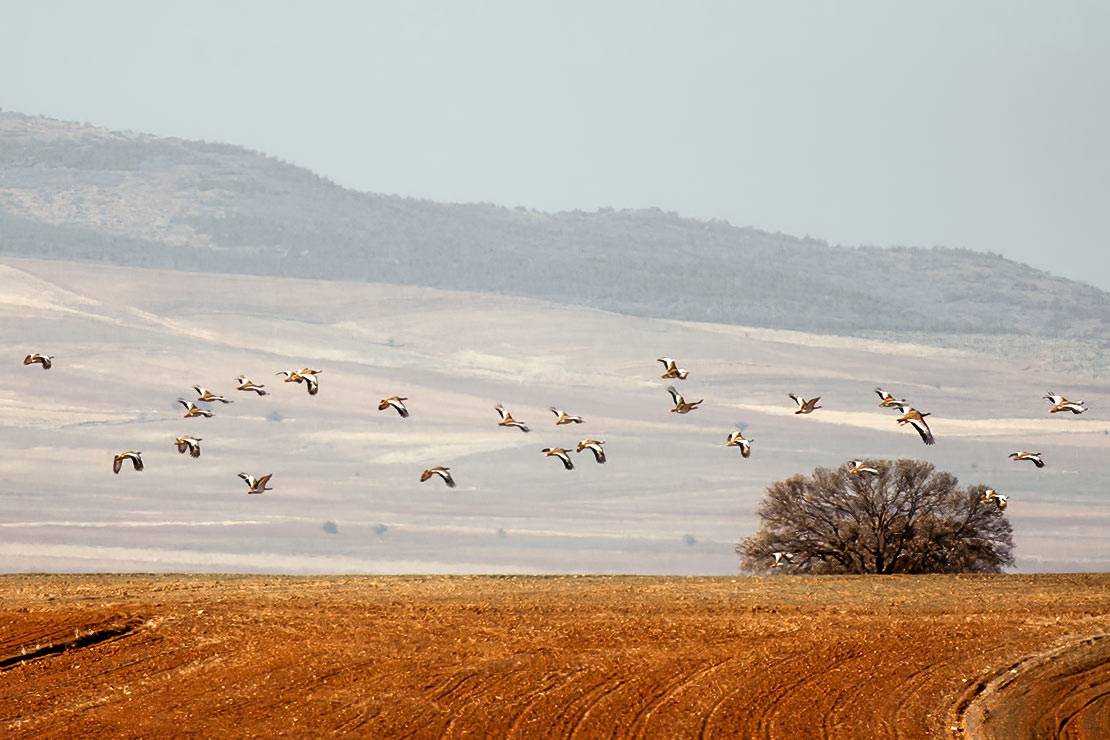
In January 2020, we provided our first ever Trevor Poyser Species Conservation Fund grant to Doğa, the BirdLife partner in Turkey for a project on the globally Endangered Egyptian Vulture Neophron percnopterus. The project entitled “Improving the conservation status of the largest Egyptian Vulture population in Turkey” was successfully completed and confirmed that the Beypazarı region holds the largest population of the species not only in Turkey, but also in the Balkans. The project also identified that electrocution from high-voltage powerlines is a key threat to the population and mitigation measures are urgently required. Further work has been identified and OSME are hoping to support this work in the future.
As our planned projects through the Youth Development Fund were dependent on physically getting together at bird camps then major changes had to be made to the programme during 2020. Plans for bird camps in Azerbaijan, North Cyprus and Egypt had to be postponed but we are hopeful that some of these can proceed during 2021. We were able to adapt our programme and we were delighted to support two new important initiatives in Georgia and Turkey. Fauna & Flora International (FFI) have been supporting work to tackle the illegal falcon trade in Georgia, including working with young falconers to educate them about bird conservation and sustainable use. OSME providing a grant through the Youth Development Fund to allow education work to continue in autumn 2020, and a short project video is available on our YouTube channel. We were approached by the Simurg Bird Sanctuary (Simurg Kuş Yuvası Derneği), Turkey who were looking to incorporate a range of youth development activities into a research project on White-headed Duck. The research component of their work had been supported through a grant by the French Embassy but they were lacking funds to cover the expenses of local students to enable them to attend training sessions. In addition to financial support, OSME had a Zoom call with the project team and students to identify a package of online training that could be delivered during 2021.
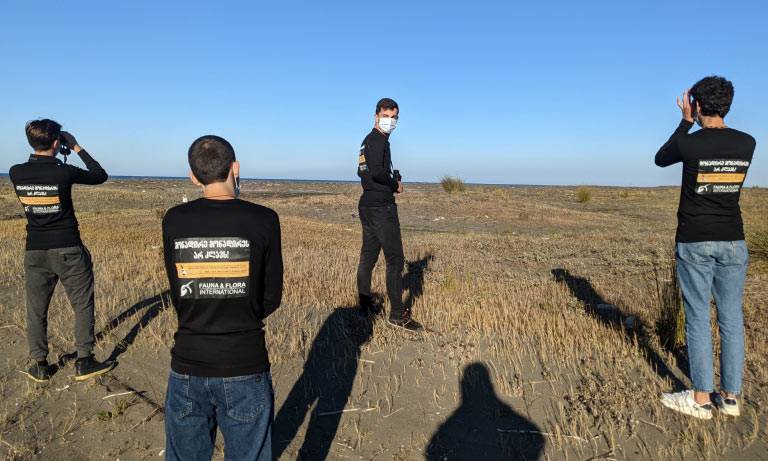
Tomas Haraldsson, OSME’s Youth Development Officer, continues to develop this crucial aspect of our work, and during 2020 he’s been laying the foundations for new projects in Jordan, Georgia and Afghanistan. Our education work has received lots of positive feedback from members and supporters and we are grateful to all those who have made donations specifically for the Youth Development Fund. Given the ongoing declines in global biodiversity, it has never been more important to develop the next generation of bird conservationists.
Linked to our Youth Development work we’ve been looking at how we can improve our Supported Member scheme and we’ll be consulting on proposals in early 2021. Buoyed by the success of holding various meeting online via Zoom, we’re keen to expand this to offering a range of discussion and training sessions targeted at our supported members. Watch this space during 2021 for more developments.
One real positive outcome of the travel restrictions put in place to combat the global pandemic has been the ‘forced’ adoption of video-conferencing facilities to hold various OSME meetings. Our regular Council meetings where trustees usually physically gather to discuss our work have all been held using Zoom. During 2020 we held three official Council meetings, and also had several shorter meetings specifically for planning certain projects. These have been just as efficient and effective as the usual physical get-togethers, and it likely that this approach will become the norm even once travel restrictions have eased. We also held our first-ever Summer Meeting online using Zoom and it was a great success enabling OSME members from across the region to ‘attend’ and listen to speakers from across the region. In August, more than 140 people attended (from 190 registrations) from 19 OSME countries (42 countries in total) to listen to four speakers, three of whom were based in the region – it was a truly OSME-wide event! Visit our website for a comprehensive summary of the Summer Meeting: https://osme.org/2020/08/osmes-first-online-summer-meeting-the-best-thing-to-come-out-of-lockdown/
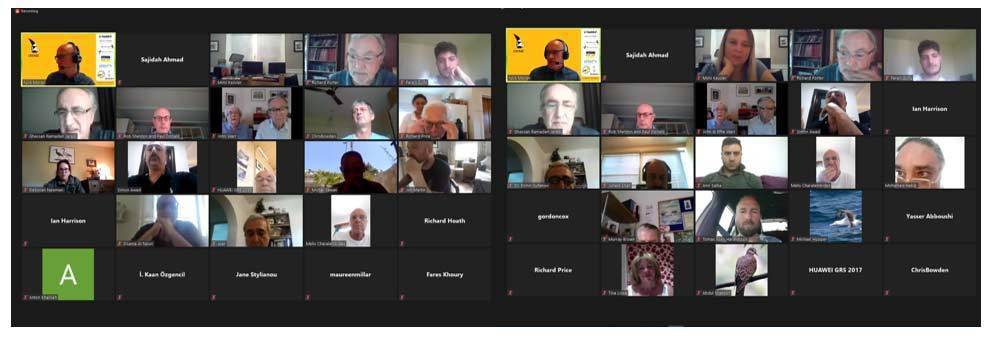
Our Annual General Meeting where the formalities of presenting and approving our annual accounts also took place online. Again, attendees from across the OSME region joined the meeting, many participating for the first time. A summary, including a video-link to the meeting is available on our website: https://osme.org/2020/12/osmes-42nd-annual-general-meeting/
Usually our Summer Meeting and AGM are combined into a single event that is based at the British Trust for Ornithology’s head-quarters at The Nunnery, Thetford, and that important connection was maintained as we were able to utilise their Zoom conferencing facilities. A massive thank you to the BTO for their continued support. I think it’s fair to say that we approached the use of Zoom with some trepidation, but thanks to the expertise of OSME Council member, Nick Moran, all the meetings ran smoothly, and we received many positive comments about how professional they were. OSME Council will certainly be looking at maintaining Zoom meetings in the coming years even once travel restrictions have eased.
Volume 42 of our highly respected journal Sandgrouse saw the production of two bumper issues totalling 376 pages – our largest ever volume. Editor Paul Donald has been strengthening the Editorial Board and seeking views from across the membership on how we can further develop our journal. Our digital version of Sandgrouse continues to be well received and an increasing number of members are choosing this format instead of a hard copy. A total of 127 members have requested the digital version alongside a hard copy, of which 56 receive their Sandgrouse in digital format only. This is resulting in some savings on international postage costs which are increasing at a dramatic rate, and it also enables members from some countries with an unreliable postal service to continue receiving their Sandgrouse. If you would like to receive a digital version of Sandgrouse then please email: Sandgrousedigital@osme.org
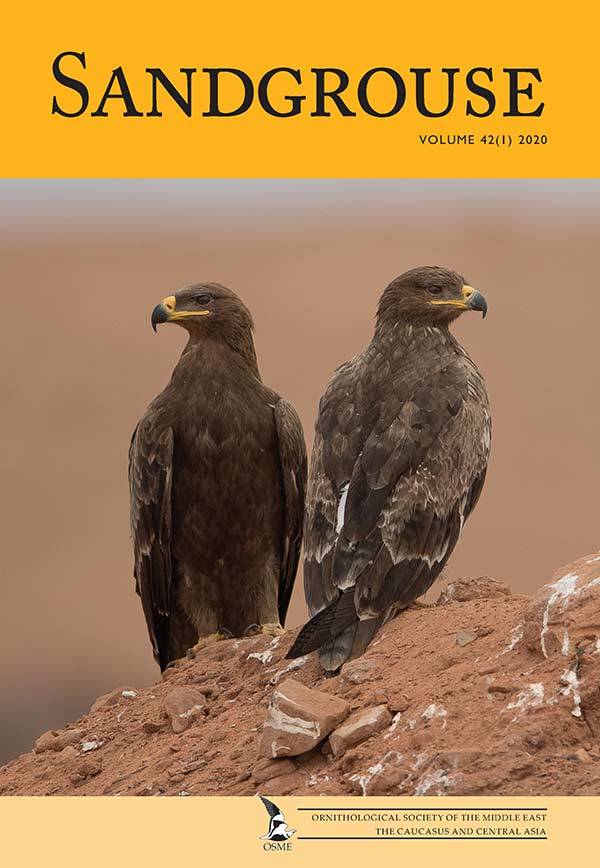
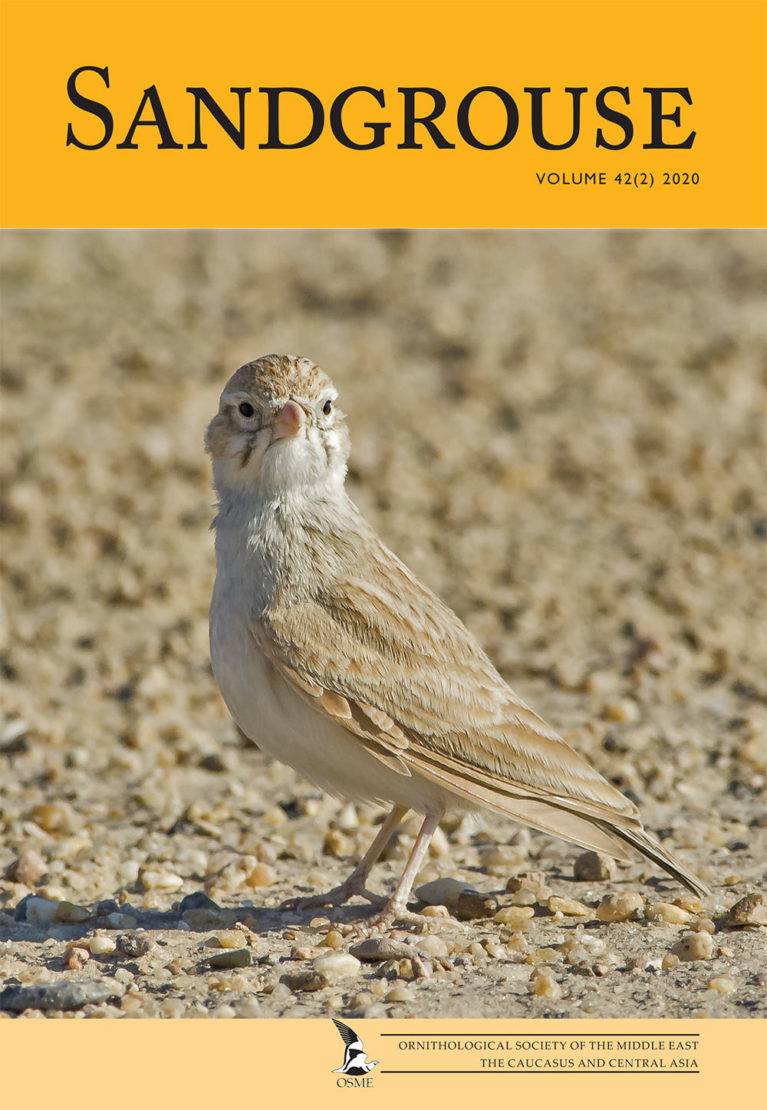
Our social media presence continues to grow, with Facebook and Twitter increasing their number of shares/follows, and lots of engagement with people from across the OSME region. We also set up an OSME YouTube for posting of video footage. Our first video was of footage from the 1985 OSME expedition to Yemen: https://www.youtube.com/watch?v=_jpvfKjrcGA
The OSME Yahoo discussion group successfully migrated to Google and still offers an excellent platform for sharing information and exchanging ideas. A substantial amount of work was undertaken behind the scenes to update our website and a huge thanks to AbdulRahman Al-Sirhan for undertaking this mammoth task. All of OSME Council’s day-to-day correspondence also moved from Yahoo to Google, including the establishment of new email addresses to enable a more professional look to our communications. A new OSME member’s email list has also been established to improve the communication of key events and activities.
Despite the upheaval created by the global pandemic, OSME’s finances remain robust and this is a reflection of the excellent stewardship of our accounts by John Warr and Chris Hughes (co-Treasurers). Our accounts were audited by Mike Jennings, approved by the AGM and submitted to the Charity Commission. All OSME Council members continue devote significant time and energy to the work of our small but effective charity. There is lots more that we can do to promote the joy of birds, birdwatching and conservation across the Middle East, the Caucasus and Central Asia – we are always looking for more members of Council – if you’d like to discuss how you can help us, then please contact me via email: chairman@osme.org
Finally, a huge thank you to all OSME members, corporate sponsors and donors who have continued to support our activities during a turbulent 2020. We couldn’t have achieved so much for the birds of the OSME region without you.
Dr Rob Sheldon, Chairman, OSME
